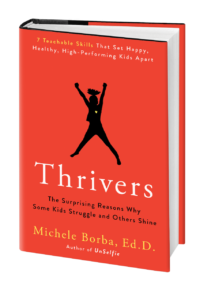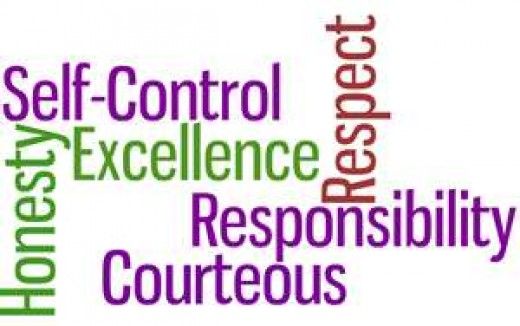The easiest way to teach kids character is not a program, but by being an example of character. Be the model you want your child to copy.
Of course, we want our children to become good, responsible, respectful and successful human beings! But in our quest to “do it all” we may forget that some of the most powerful ways to help our children become good people aren’t in the things we buy, but in the simple things we say and do. And how our children need those examples! Too many adults are behaving very, very badly, and those images do affect our kids.
Example is everything. In fact, the Greek philosopher, Aristotle, years ago said that the best way to teach character is by modeling good example. Beware: I swear kids come with video recorders planted inside their heads and we know it when they play us back at the most inopportune moments–usually when the relatives arrive.
The bottom line is the kids are watching us and they are copying–the good, the bad, and the very ugly things we say and do. Just in case you need any proof here are a few things our children pick up from watching us:
Behavior. Prejudice. Stress management. How we cope with defeat. Resilience. Integrity. Organizational style. Driving safety. Drinking styles. Eating habits. Friendship making. Goal-setting. Values. Sleeping habits. Television viewing. Courtesy. Discourtesy. Punctuality. Religion. Love of reading. Lifestyle choices. Interests. Responsibility. Digital citizenship. If we bounce back. Self-talk. Pessimism. Optimism. Money Management. Procrastination. Frugality. Patriotism. Biases. Friendship keeping. Valuing education. Conflict resolution. Empathy. In short, CHARACTER!
The list goes on and on!
Here are just 50 things to say to boost our own example to our kids so we become the model we hope they copy. And how our children desperately need role models. Please, let them look to us!
1. “Thank you! I really appreciate that!” (Courtesy)
2. “Excuse me, I need to walk away and get myself back in control.” (Stress and anger management)
3. “I’m going to call Grandma and see how she’s doing. She looked lonely.” (Empathy, compassion)
4. “Mrs. Jones is sad. I’m baking her some cookies. Want to help?” (Charity)
5. “I don’t want to watch this anymore. I don’t like how they are portraying…(women, men, kids, a race, a culture, a religion…). (Values and stereotyping)
6. “Excuse me. I didn’t mean to interrupt you.” (Admitting mistakes. Manners)
7. “That’s my two cents. I’d love to hear yours.” (Communication style)
8. “I lost my temper there. I’m going to work on counting to 10 when I get so stressed.” (Anger management)
9. “I blew it. Next time I’ll….” (Handling mistakes)
10. “I’m going to set a goal for myself this year. I’m working on….” (Goal-setting)
11. “I’m so upset with my friend-remind me not to send her an email until I cool off.” (Online behavior)
12. “Please repeat that. I don’t understand.” (Conflict and communication style).
13. “I’m so stressed lately…I’m going to (start walking, eat healthier, write in a journal, listen to soothing music, or whatever) to help me relax.” (Stress management, coping)
14. “I want to listen. Let me turn off my cell phone.” (Digital citizenship)
15. “I have so many things to do today. I’m going to make a list so I don’t forget anything.” (Organization)
16. “That woman looks like she’s going to drop those packages. Let’s ask if she needs help.” (Kindness)
17. “Apologies…that was my fault. Hope you forgive me.” (Forgiveness)
18. “I’m driving and need to keep my eyes on the road. Please turn off my phone for me.” (Driving safety)
19. “I love watching the Oscars, but let’s not focus on their dress designers but their talent. How do you think Sandra Bullock prepared for her role in space.” (Valuing quality over materialism)
20. “She’s my friend and doesn’t want me to tell anyone. I’m honoring her request.” (Friendship. Loyalty)
21. “I’m getting upset and need to take a time out. Let’s talk in a few minutes.” (Anger management)
22. “Great question-I don’t that answer. But I’ll try to find it for you.” (Admitting shortcomings)
23. “They do look different than us, but they have the same feelings. Let’s think about how we’re the same.” (Prejudice)
24. “Didn’t she just move here? Let’s go introduce ourselves and ask her to sit with us.” (Courtesy. Kindness)
25. “If it’s not respectful I’m not sending it.” (Digital citizenship)
26. “But is that true for all elderly people? Aunt Harriet remembers everything and she’s 87. Let’s think of more examples.” (Stopping prejudice and bias)
27. “Every month I’m going to set a new goal. You’re going to help remind me to stick to it!” (Goal-setting)
28. “We hear so much about the “bad” stuff–let’s look through the paper and find the good things people are doing for each other. We could start ‘Good News’ reports.” (Optimism, attitude)
29. “I need to take care of myself and eat healthier.” (Self-care)
30. “I’m going to walk around the block. Want to come? It always helps me relax.” (Self-care)
31. “I taped ‘No’ on a card on the phone to remind me to not to take on so much. I’m prioritizing my family!” (Priorities)
32. “I’ve got to catch my words-I’m becoming too negative.” (Attitude. Optimism)
33. “Let’s set ‘unplugged times’ for our family. What about from 6 to 8 pm?” (Prioritizing family).
34. “I do like it, but I’m going to wait until it’s on sale.” (Frugality, delaying gratification).
35. “I always try to save half of my paycheck.” (Money management)
36. “Those children lost everything in that fire. Let’s go through our closets and find gently used clothes and toys to bring them.” (charity)
37. “I’d love to eat that now, but I’m going to wait until after dinner.” (Self-control)
38. “I know it sounds fun, but I need to finish my job. My motto is, “Work first, then play.” (Responsibility)
39. “Thanks, but no thanks. I’m driving so I can’t drink.” (Drinking behavior)
40. “My favorite thing to do is read! Let’s go to the library sale and find books to bring on our vacation.” (Instilling a love of reading).
41. “Let’s stay open-minded and give Daniel a turn. We didn’t hear his side.” (Non-judgmental)
42. “That’s not fair. We agreed on the rules so let stick to them.” (Fairness).
43. “I know we wanted to win, but we didn’t. They were better than us, so let’s go congratulate them.” (Sportsmanship)
44. “I need to go write a thank you to Peter before I forget. He put a lot of thought into that present and I want to make sure he knows how much I appreciate it.” (Gratitude)
45. “Thanks, but you don’t need to give me any money. I did it because I wanted to help.” (Charitableness)
46. “I’m going to stop talking about dress sizes and jumping on the scale, and start thinking about eating healthier instead.” (Self-image)
47. “I’ve got to get to the polls before they close. Voting is something I take very seriously.” (Citizenship)
48. “Let’s stop and think about how she feels. She looks sad-let’s get in her shoes for a minute.” (Empathy)
49. “I’m not just going to stand by when someone could get hurt. I’m asking if he wants help.” (Responsibility. No by standing!”)
50. “Everyone can make a difference. Let’s think of something we can do.” (Personal responsibility. Empowerment)
What can you say to a child today to be the example he or she can use for tomorrow?
Beware, the children are copying!
Michele Borba
 This article is an excerpt from my book, Thrivers: The Surprising Reasons Why Some Kids Struggle and Others Shine (March 2021). that explains why the old markers of accomplishment (grades, test scores) are no longer reliable predictors of success in the 21st century — and offers 7 teachable character strengths that boost resilience and will safeguard our kids for the future. You’ll also find dozens of ways to teach the skills and abilities children need to learn them so they can thrive both now and later.
This article is an excerpt from my book, Thrivers: The Surprising Reasons Why Some Kids Struggle and Others Shine (March 2021). that explains why the old markers of accomplishment (grades, test scores) are no longer reliable predictors of success in the 21st century — and offers 7 teachable character strengths that boost resilience and will safeguard our kids for the future. You’ll also find dozens of ways to teach the skills and abilities children need to learn them so they can thrive both now and later.
Also check out: UnSelfie: Why Empathetic Kids Succeed in Our All-About-Me World. You’ll find dozens (over 300) simple, proven ways to cultivate empathy in children as well as help them learn the nine essential habits that nurture empathy. The book is now in hardback as well as paperback and Kindle.


